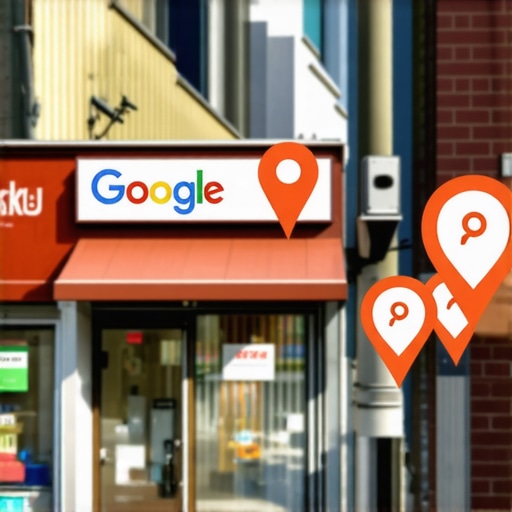Unveiling the Next Frontier of Local SEO: Strategies for Dominating Google Maps in 2025
In an era where local search visibility can make or break small businesses, understanding the intricacies of local SEO—especially Google Maps optimization—has become paramount. As search algorithms evolve, so do the tactics required to ascend to the coveted Google Maps Top 3. This article synthesizes expert insights, advanced techniques, and the latest industry trends to equip local business owners and SEO professionals with the tools necessary for 2025 and beyond.
Why Local SEO Is the Cornerstone of Small Business Growth in 2025
Local SEO drives targeted traffic, enhances customer engagement, and significantly boosts conversion rates. According to Moz’s local search ranking factors, citations, reviews, and profile optimization are critical components. The competitive landscape intensifies as more businesses recognize the value of Google Maps visibility, prompting a need for strategic, data-driven approaches.
Leveraging Hyperlocal Campaigns for Unmatched Market Penetration
Hyperlocal marketing, especially in the context of Google My Business (GMB), allows for precise targeting within specific neighborhoods or regions. Developing hyperlocal campaigns that incorporate geofencing, localized content, and community engagement can accelerate your rise into the Top 3. For instance, creating contextually relevant GMB posts tailored to local events or seasonal trends can enhance relevance and visibility.
Optimizing Google Business Profile with Advanced Techniques
Effective profile optimization extends beyond basic NAP consistency. Incorporating semantic keywords into your business description and service areas, utilizing schema markup, and regularly updating high-quality photos are essential. For detailed implementation strategies, see this comprehensive guide.
How to Build Authoritative Citations and Backlinks in 2025
Backlink and citation strategies must adapt to evolving search engine algorithms. Prioritizing high-trust directories, leveraging niche-specific backlinks, and ensuring citation consistency can significantly impact rankings. Tools like Moz Local and BrightLocal facilitate citation audits, while strategic outreach ensures backlinks are relevant and authoritative.
Can Customer Reviews Be Transformed into a Powerful SEO Asset?
Absolutely. Reviews influence local pack rankings and consumer trust. Encouraging genuine reviews and responding professionally can boost your profile’s credibility. According to Google’s own documentation, reviews are a key ranking factor, and integrating review management into your SEO workflow is essential for sustained success. For advanced review strategies, explore this expert resource.
Emerging Trends and Open Challenges in Google Maps SEO for 2025
The landscape is dynamic, with AI-driven local search personalization and voice search integration presenting new opportunities. However, challenges such as data privacy concerns and increasing competition necessitate continuous adaptation. Engaging with industry forums, such as SEO Mastermind groups, can provide real-time insights and collaborative solutions.
What Are the Most Overlooked Factors That Impact Google Maps Rankings?
Many overlook the importance of consistent business information across all online platforms, the role of local backlinks, and the influence of social signals. These nuanced factors, when optimized, can provide a competitive edge. Regular audits, as described in this authoritative guide, are crucial for maintaining top rankings.
To stay ahead in local SEO, especially in the competitive environment of 2025, businesses should adopt a holistic, expert-driven approach that combines technical optimization, content relevance, and reputation management. Explore comprehensive strategies here and consider engaging with specialists to refine your tactics continually.
For those seeking to deepen their expertise, collaborating with industry veterans and participating in local SEO webinars can provide actionable insights and innovative techniques tailored to your specific market challenges.
Harnessing the Power of Local Schema Markup for Enhanced Visibility
One of the most underestimated yet impactful strategies in Google Maps SEO is the proper implementation of local schema markup. By embedding localized schema on your website, you provide search engines with explicit details about your business, including location, hours, services, and more. This semantic enhancement not only boosts your chances of appearing in rich snippets but also ensures your profile is accurately represented across search results. For detailed implementation, consult this comprehensive guide.
What Role Do Niche-Specific Backlinks Play in Local Rankings?
Beyond general backlink building, acquiring backlinks from niche-specific directories and industry-related sites can significantly influence your local SEO authority. These backlinks are seen as endorsements within your particular sector, increasing your credibility and relevance in local searches. Tools like Moz Local and BrightLocal facilitate citation audits to identify high-impact backlink opportunities. Engaging with local industry associations or sponsoring community events can organically generate these valuable links.
Integrating Voice Search Optimization into Your Local SEO Strategy
With voice search adoption surging, optimizing for voice queries has become essential. Focus on natural language keywords, question-based phrases, and conversational content that mirror how users speak about local services. For example, instead of targeting “best pizza near me,” optimize for “Where can I find the best pizza restaurant nearby?” For actionable tips and the latest voice SEO techniques, explore this expert resource.
How Can Small Businesses Leverage AI and Machine Learning for Continuous SEO Improvement?
Emerging AI tools are revolutionizing local SEO by providing real-time insights, predictive analytics, and personalized content recommendations. For small businesses, leveraging platforms that incorporate machine learning can help identify ranking opportunities, monitor competitors, and automate routine SEO tasks. This proactive approach ensures your strategies stay adaptive amid evolving algorithms. Industry reports from sources like Search Engine Journal underscore the importance of embracing AI-driven solutions for sustained growth.
If you’re eager to deepen your understanding of cutting-edge local SEO tactics, consider exploring this detailed strategy guide. Sharing your experiences or questions in the comments can also help foster valuable community insights and collaborative learning.
Harnessing the Power of Local Data Analytics for Hyper-Targeted Campaigns
In the rapidly evolving landscape of local SEO, leveraging sophisticated data analytics is no longer optional—it’s essential. By harnessing tools such as Google Analytics, Google Data Studio, and emerging AI-driven analytics platforms, businesses can unearth granular insights about customer behaviors, preferences, and search intent. For instance, analyzing foot traffic patterns, dwell time, and conversion metrics allows for hyper-targeted campaigns that resonate on a personal level, dramatically improving your Google Maps rankings.
Implementing these insights involves segmenting your audience based on demographic, geographic, and behavioral data, then tailoring your GMB posts, special offers, and service descriptions accordingly. The integration of predictive analytics can forecast future trends, enabling proactive adjustments to your local SEO strategy. This approach ensures your business remains competitive amid intensifying local search competition.
Implementing Advanced Schema Markup for Richer Local Snippets
While basic schema markup enhances your visibility, advanced schema implementation pushes your local SEO to the next level. Incorporating detailed local business schema, including event, product, and review schemas, allows search engines to display richer snippets—such as event dates, product availability, or review ratings—directly in search results and Google Maps.
Moreover, leveraging JSON-LD format for schema markup ensures compatibility and ease of updates. For example, embedding schema for service offerings with precise pricing, availability, and descriptions not only improves search visibility but also enhances user experience by providing immediate, actionable information. To master this, consult Google’s official structured data guidelines.
Nuanced Role of Social Signals and Local Engagement Metrics in Rankings
Despite their perceived secondary importance, social signals—such as shares, likes, and local community engagement—are increasingly influencing local search rankings. Search engines interpret social signals as indicators of trust, relevance, and authority within your community niche. Therefore, fostering active social media engagement, encouraging user-generated content, and participating in local online communities can significantly boost your local SEO performance.
Additionally, measuring local engagement metrics like check-ins, event participation, and local mentions provides a broader picture of your community influence. Integrating these signals into your SEO analytics dashboard with tools like Brandwatch or Sprout Social helps refine your strategy, ensuring your business maintains a vibrant local presence that search engines recognize as authoritative.
Frequently Asked Question: How Can I Integrate Multi-Channel Data for a Cohesive Local SEO Strategy?
Integrating multi-channel data involves aggregating information from physical store visits, social media interactions, review platforms, and online search behavior into a unified dashboard. This holistic view enables you to identify cross-channel trends, optimize messaging consistency, and allocate resources effectively. Platforms like SEMrush and HubSpot offer integration options that centralize your data, allowing for advanced segmentation and personalized outreach. This cohesive approach ensures your local SEO efforts are synchronized across all touchpoints, amplifying their impact.
For a deeper dive into multi-channel integration techniques, explore industry case studies and whitepapers from leading SEO analytics providers. Continuous learning and adaptation are key to maintaining dominance in local search results in 2025 and beyond.
Embrace these cutting-edge strategies today to position your business at the forefront of local SEO excellence. For tailored guidance, consider consulting with local SEO specialists who can help you implement these advanced tactics effectively.
Unraveling the Impact of Local AI-Driven Personalization on Google Maps Rankings
As artificial intelligence continues to refine local search algorithms, understanding how AI personalization influences Google Maps visibility becomes crucial for SEO professionals. Recent industry reports, such as those from Search Engine Land, highlight that AI-driven user context and behavioral data are now pivotal in ranking factors, enabling hyper-specific local results tailored to individual preferences. Harnessing this trend requires integrating AI analytics platforms into your local SEO workflow, allowing for real-time adjustments based on dynamic user interactions.
Can Blockchain Technology Revolutionize Local Business Listings and Trust Signals?
Emerging research suggests that blockchain’s decentralized nature could enhance the authenticity and security of local business data. Implementing blockchain-based verification processes can reduce fraudulent reviews, ensure citation integrity, and foster consumer trust. According to a recent whitepaper by the IEEE, integrating blockchain with local SEO not only fortifies data credibility but also opens new avenues for reputation management and verified customer engagement.
What Are the Cutting-Edge Techniques for Hyperlocal Content Personalization?
Advanced hyperlocal content strategies involve leveraging geofencing data, local event APIs, and user-generated content to craft highly relevant messaging. For example, dynamically populating Google My Business posts with event-specific promotions or local news enhances relevance and user engagement. Tools like BrightLocal now offer AI-powered content suggestions, enabling businesses to maintain fresh, context-aware profiles that resonate with local audiences.

How Does Multi-Channel Data Integration Elevate Local SEO Performance?
Integrating data from online and offline touchpoints—such as social media, review platforms, and in-store analytics—creates a comprehensive view of customer journeys. Platforms like HubSpot and SEMrush facilitate this aggregation, allowing for advanced segmentation and personalized outreach. This holistic approach ensures consistent messaging, improves local relevance, and enhances Google Maps rankings by demonstrating a unified, authoritative local presence.
Why Is Local Schema Markup Becoming Indispensable for Rich Snippets in 2025?
Implementing detailed local schema markup—covering services, events, products, and reviews—is essential for securing rich snippets and enhanced visibility. JSON-LD remains the preferred format due to its ease of implementation and compatibility. According to Google’s developer documentation, meticulous schema deployment boosts your chances of appearing in rich results, thereby attracting more local clicks and conversions.
How Can Voice Search Optimization Transform Your Local Visibility?
Optimizing for voice search involves focusing on conversational keywords, question phrases, and local intent signals. Leveraging structured data to answer common queries can position your business as a top voice search result. Industry studies from Backlinko reveal that voice search queries tend to be longer and more natural, necessitating a shift toward more natural language content and FAQ pages tailored for voice SEO.
Expert Insights & Advanced Considerations
1. Embrace AI-Driven Personalization
Leverage artificial intelligence to tailor local search results, enhancing user experience and outranking competitors by providing hyper-relevant content and offerings based on user behavior and preferences.
2. Prioritize Data Privacy & Trust Signals
Implement blockchain verification and secure data practices to build consumer trust, reduce fraudulent reviews, and solidify your authority in local search rankings.
3. Optimize for Voice & Visual Search
Develop conversational content and utilize structured data to capture voice queries, while integrating high-quality images and videos to dominate in visual search results on Google Maps and beyond.
4. Harness Local Data Analytics & Predictive Modeling
Utilize advanced analytics platforms to analyze foot traffic, engagement metrics, and search intent, enabling hyper-targeted campaigns that adapt proactively to emerging trends.
5. Implement Comprehensive Schema Markup
Use detailed local schema including events, products, and reviews with JSON-LD format to enhance rich snippets, increasing visibility and click-through rates in local packs.
Curated Expert Resources
- Google Developers Structured Data Guidelines: Essential for implementing schema markup effectively and understanding rich snippets.
- Search Engine Journal: Industry insights on AI, voice search, and local SEO innovations shaping 2025 strategies.
- Moz Local & BrightLocal: Tools for citation management, backlink analysis, and local authority building.
- Backlinko’s Voice Search Optimization Guide: Comprehensive techniques for capturing voice-driven local queries.
- IEEE Whitepapers on Blockchain & SEO: Cutting-edge research on decentralization, trust, and verification in local business data.
Final Expert Perspective
As Google Maps SEO evolves rapidly towards a future dominated by AI personalization, privacy, and multimodal search, mastering these advanced tactics becomes essential for local businesses aiming for top rankings. Integrating insights from industry leaders and leveraging innovative tools will position your business at the forefront of local SEO success in 2025. Engage with these resources, continuously adapt your strategies, and share your insights to stay ahead in the competitive local search landscape.


